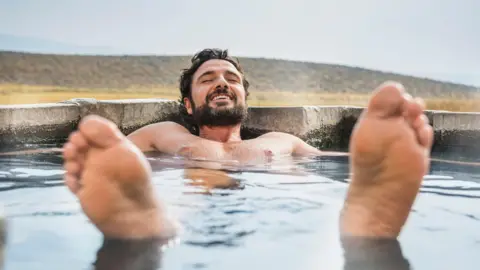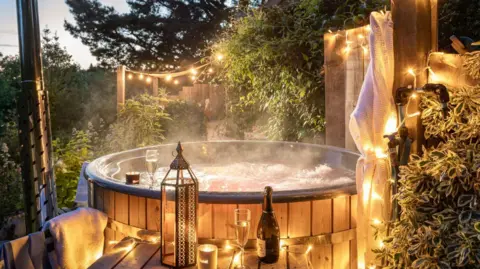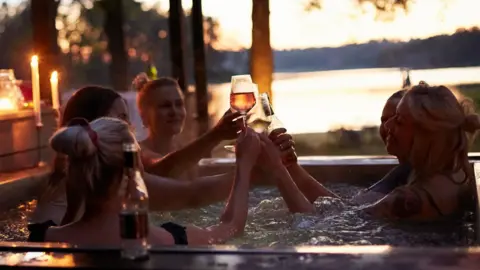ARTICLE AD BOX
Just now
Christine Ro,Technology Reporter

 Getty Images
Getty Images
Many holiday parks see hot tubs as a standard feature
Some people give Severin Borenstein a hard time for having a hot tub.
“Generally the criticism of owning a hot tub is it is a profligate use of energy,” he says.
The main reason for such high energy usage is the heating, which generally runs even on days when the hot tub isn’t being used, to keep the water from overcooling.
Because Prof Borenstein researches energy economics at the Haas School of Business, at the University of California, Berkeley, he was able to drill down into the numbers for his household.
He and his wife use their hot tub regularly, about five times a week.
“To keep the hot tub hot every day, on average I would have to heat it about 30 minutes per day, to make up for the heat loss,” he explains. The hot tub filters for about six hours a day, and gets emptied and refilled around three times a year.
The energy usage of the hot tub amounts to approximately 18% of his household’s electricity usage.
Prof Borenstein calculated that running the hot tub for a year creates greenhouse gas emissions slightly less than for a one-way flight between Boston and London.
That’s considerable and it's prompted some to brand hot tubs as "energy hogs", along with heated sheds, swimming pools and second fridges.
According to Uswitch, hot tubs are likely to be the most energy-hungry appliances in the home.

 Weekend Candy
Weekend Candy
It's estimated a hot tub can raise bookings by between 10 and 20%
There are measures that can make the hogs a bit less greedy.
One factor is how a hut tub is powered.
Hot tubs usually come with their own electric heaters, so using a green energy source will cut the carbon dioxide footprint.
Those heaters can also be combined with solar water heating, to cut the need for electricity.
However, for those installing hot tubs in their owns homes, that might be an extra level of complexity.
For retail customers, “simplicity is key,” says Karl Rowntree, the technical director for the UK hot tub manufacturer RotoSpa.
Holiday parks are more open to alternative heating systems, including solar and biomass boilers (which can run on wood pellets or even coffee waste) and heat pumps.
A heat pump for a hot tub would be more energy-efficient than an electric heater. The buyer’s guide WhatSpa? estimates that a standard electric heater uses more than three times as much power during a heating cycle, compared with an air-source heat pump.
Mr Rowntree says that an air-source heat pump can cut energy costs by up to 75%, and can pay for itself within three years.
Other factors include how well the tub is insulated and covered, to reduce heat loss; how large it is, which affects how much water needs to be heated; and the temperature settings.
Mr Rowntree says that energy efficiency features on the control system can also help. He uses a sleep timer on his own tub, which he puts in sleep mode between 11:00 and 07:00.
Although it cools down overnight, it's still cheaper than leaving it on through the night, he explains.
Of course, there is the option of a wood-fired hot tub. Its environmental impact would partly depend on whether the wood was from a sustainable source, but burning wood is always going to produce carbon dioxide.
More Technology of Business
For tourism operators, another important component is guest behaviour. At AliKats, a set of chalets in the French Alps, the hot tubs are very popular.
But the company, whose region experienced drought in the last couple of years, identified its 1,500l hot tubs as an area where its energy and water use should be reduced.
This led the company to institute a new hot tub policy, where guests have to pay more to use a hot tub in the summer, or if their hot tub requires a mid-week water change.
“In the winter, most guests still want to opt in to the hot tub but increasingly in the summer, more and more guests are opting out,” says Al Judge, the cofounder of AliKats.
As for the mid-week water change, the company believes that this is easily avoided with proper usage, such as showering before entering the hot tub.
In addition, “the key thing we have done this year is insist on no drinking in the hot tub and this has allowed us to keep the water going much longer.”
Mr Judge explains: “When beer gets spilled in the hot tub, the yeast reacts with the water (at 37.5 degrees) and it turns unpleasant very quickly. So by stopping drinking in the hot tub, it’s had a strong positive environmental effect.”

 Getty Images
Getty Images
Some owners have banned alcohol in hot tubs
The hot tub market has had a few rollercoaster years. Hot tub sales boomed in 2020 and 2021, during the Covid-19 pandemic. In the UK, sales slumped in 2022 and 2023 due to the high cost of living and high electricity prices.
Finally, “we’re starting to see an upturn now,” says Mr Rowntree.
He reports that RotoSpa was selling about 600 a year pre-Covid, 2,500 during the pandemic, and now roughly 1,000.
Much of the gradual uptick comes down to the popularity of hot tubs in vacation rentals. UK holiday property owners who are part of the Weekend Candy and ToWander UK networks report that having a hot tub can boost bookings by 10–20%.
However, the costs of maintaining hot tubs can be substantial. Last year, at Yorkshire’s Baxby Manor, owner Barney Smith installed three hot tubs with air-source heat pumps, as well as solar panels and battery storage.
“Despite this it still costs me around £100 between every changeover to fully clean, re-fill and heat each hot tub,” Mr Smith reports.
Even with the maintenance and energy requirements, many tourism entrepreneurs believe that hot tubs are now indispensable.
“I would say they are starting to be expected as standard,” says Yasmin Wilkes, the owner of Loose Reins in Dorset, where hot tubs were added in 2022 and 2023.
Back in California, Prof Borenstein says a narrow focus on energy consumption, perhaps misses the "bigger picture" around hot tub use.
That includes health benefits such as reduced blood pressure and improved sleep.
“There are many things we do that have environmental impact,” he reflects.

 1 year ago
35
1 year ago
35








 English (US) ·
English (US) ·